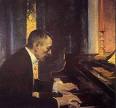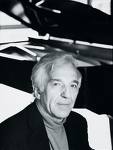S. Rachmaninov: Piano Concerto No.2 – Vladimir Ashkenazy

S. Rachmaninov: Piano Concerto Nº 2 in C minor Op. 18
Pianist: Vladimir Ashkenazy
London Symphony Orchestra
Conductor: André Previn
Recorded in 1972. Decca #444839.(CDs with all four of Rachmaninov’s Piano Concertos).
The composer
Sergei Rachmaninov, pianist, conductor and composer, was born in Russia (Novgorod) in 1873. From age 12 he lived in Moscow with teacher and mentor Zverev, studying piano and immersed in the rich cultural life of the capital. When in 1892 he graduated from the Moscow Conservatory, he was already noted as a composer (with a first piano concerto, an opera and many other works to his credit), and enjoyed strong support from Tchaikovsky (no less!). His growing fame as a composer received a setback in 1897, when his first Symphony was badly received. Then for three years he set nothing on paper, working as pianist and conductor. But when he recovered from his depression, he wrote this Second piano concerto, which was received enthusiastically at its premier in 1901, and has been well-loved ever since. Up until 1917 Rachmaninov worked as a conductor (directing some famous opera productions at the Bolshoi theatre) and as a composer, writing mainly during the summer in his retreat outside Moscow. After the Bolshevik revolution in 1917, and the radical changes in conditions, Rachmaninov managed to leave Russia, and he took up residence in the United States. There he became most famous as a concert pianist, playing Chopin, Schumann, Lizst, but most of all his own compositions. Rachmaninov playing Rachmaninov was guarantee of a sell-out, and fortunately many of his own recordings are available to us today. His meticulous technique and attention to detail were legendary. In 1926 he took up composing again, and in 1930 moved to Switzerland – but was forced to leave for the US again by the outbreak of war in 1939. There he again worked as renowned pianist and conductor until his death in 1943, just short of 70.
Rachmaninov was born 40 years after Brahms and was a contemporary of Debussy, Ravel, and Prokofiev – but his music is rooted firmly in the nineteenth century. Lovely melodic themes, rich harmonies, often a melody emerging from the middle of an arcade of chords or glittering piano runs – this is the stuff of Rachmaninov’s music. Not much experimentation with dissonance or new sounds and rhythms – and for this he is considered the last of the great romantic composers. A voice from the past reaching far into the strife of the twentieth century.
The artists
Vladimir Ashkenazy was also born in Russia (in 1937) and began his rise to fame through winning piano competitions in 1956 and 62. He tours extensively to the major music centres of the world, performing as soloist or with top-flight artists, and has an enormous repertoire. From 1970 on, he became increasingly active as a conductor, being strongly associated with London’s Philarmonia Orchestra. Among the major pianists of today, I find Ashkenazy’s playing to be a model of correctness – not too much bravado, not too much emotion, but an impeccable execution, well matched to the composer’s intent. Perhaps even a benchmark.
 André Previn, here conducting the LSO, is another famous pianist, conductor and composer. Born in Berlin in 1929 but resident in the States from 1938, he has had an amazingly prolific career as jazz pianist and arranger as well as in classical music (and as husband as well – Dory Previn, Mia Farrow, Anne-Sophie Mutter!).
André Previn, here conducting the LSO, is another famous pianist, conductor and composer. Born in Berlin in 1929 but resident in the States from 1938, he has had an amazingly prolific career as jazz pianist and arranger as well as in classical music (and as husband as well – Dory Previn, Mia Farrow, Anne-Sophie Mutter!).

Taking the first-class orchestra for granted, the fourth element in listening to this recording is really your image of Russia. Mine, strongly influenced by the film of Dr. Zhivago and Tolstoy’s novels, is of vast snowy steppes, endless forests, long spells of solitude, then enormous buildings, rich furnishings, music, ballet, beautiful women, passions and separations….
The recording
Throw these all together and you have this recording. As one might expect from Ashkenazy as heir to Rachmaninov, and with his unusually close artistic understanding with Previn, there is a strong sense of rightness about it – this is the way this music should be. All through the piano is closely entwined with the orchestra, sometimes playing decorations, sometimes taking the lead. And pervading all is a warmth, a passion and – a recurrent melancholy.
The first movement Moderato starts with quiet chords from the piano, which lead to a wonderfully warm melody played by the cellos, and a rippling piano part which leads to a sharp climax, cut off for the second theme to be introduced by the piano. Intertwining the themes and instruments, the music gradually strengthens, becomes vigorous, walks tall…… and then slowly returns to a reflective sadness, which ends in sudden defiance.
The second movement Adagio sostenuto is serene -the melody from the woodwind and the Moonlight-sonata-type piano remind one of a boat moving smoothly over a lake. The piano takes the melody and reworks it, gradually moving more, strengthening with saddened emphasis, to erupt into a running passage which cuts off ……and into the silence drop some bewildered chords…… and then we’re back on the lake, with the theme coming and going in the mist of sound, fading into silence.
Allegro scherzando gives hope of brighter things like a Cossack dance (and a few vodkas), but the cheeky theme soon turns into a broad, passionate melody, which once more lapses into melancholy. Another attempt at brightness shows the orchestra and piano brilliantly interwoven – but back comes the broad theme….. until finally the piano takes command -then the full orchestra opens its heart while the piano chords cascade up and down, to a triumphant ending.
So this then is one of the best-loved piano concertos, in a wonderful performance. Perhaps also a glimpse into the sombre recesses of the Russian soul – but withall a work of great beauty.
Good listening!